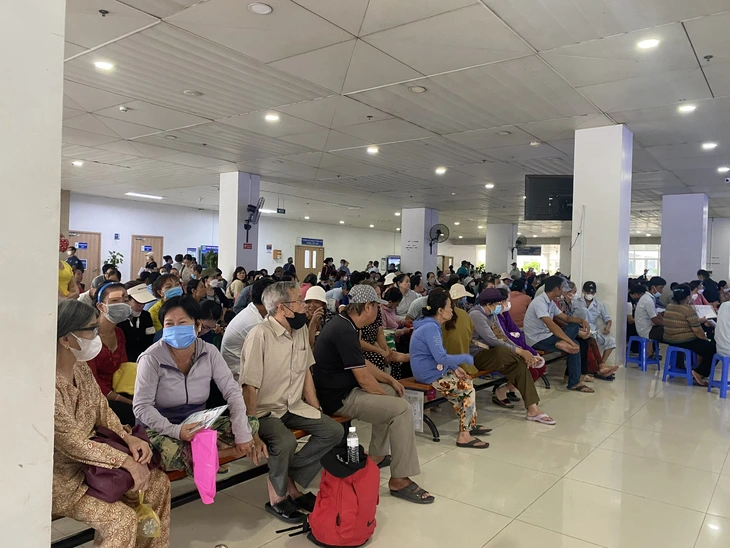
Patients waiting for medical examination at Ho Chi Minh City Oncology Hospital - Photo: XUAN MAI
On the morning of May 21, Director of the Ho Chi Minh City Department of Health Tang Chi Thuong said that with the approval of the Ho Chi Minh City People's Committee, on May 20, the City Department of Health coordinated with the Department of Health of Binh Duong province and the Department of Health of Ba Ria - Vung Tau province to organize a workshop (first time) to assess the scale of medical service provision after the merger, as a practical basis for developing a plan to arrange the Ho Chi Minh City health system after the merger.
The workshop was attended by the full participation of the leaders of the three Departments of Health. The delegates listened to and discussed enthusiastically the important issues of the workshop's theme, under the chairmanship of the Director of the Ho Chi Minh City Department of Health.
Ho Chi Minh City's final hospitals will be overloaded if there are no proactive solutions.
With the area of Ho Chi Minh City being 2,095km2 , it is forecasted that the scale of healthcare service provision after the merger will increase to 6,772km2 . The population will increase from 9.9 million people to more than 13.7 million people.
At that time, the demand for medical services will increase very high, both in terms of demand and scope of supply. Medical resources will increase, but certainly in the first stage it will not be commensurate with the increase in demand and scope.
Specifically, the number of hospitals in Ho Chi Minh City will increase from 134 to 164 (Binh Duong: 27 hospitals, Ba Ria - Vung Tau : 13 hospitals). The number of hospital beds will increase from 41,525 to 49,147 (Binh Duong: 5,202 beds, Ba Ria - Vung Tau: 2,420 beds).
The ratio of hospital beds per 10,000 people will decrease from 41.7 to 31.3 (the current target is 42 hospital beds per 10,000 people).
The number of doctors will increase from 20,727 to 24,629, the ratio of doctors/10,000 people will decrease from 20.8 to 13.08 (the current target is 21 doctors/10,000 people).
The ratio of nurses per 10,000 people will decrease from 37 nurses per 10,000 people to 29 nurses per 10,000 people (the current target is 39 nurses per 10,000 people).
In addition, the total number of public services of the city's health sector will increase from an average of more than 20,000 records/year to over 30,000 records/year.
Delegates attending the workshop agreed on the forecast that the number of medical examinations and treatments will increase at general and specialized hospitals in Ho Chi Minh City after the merger.
Specifically, the number of medical examinations will increase from over 42 million visits/year to over 51 million visits/year. The number of inpatient treatments will increase from over 2.2 million visits/year to over 3.8 million visits/year.
Thus, if compared nationwide, the Ho Chi Minh City health system will provide approximately more than 30% of outpatient visits and more than 23% of inpatient treatments nationwide.
The risk that Ho Chi Minh City's final-level hospitals will be overloaded is quite clear if the health sector does not proactively find appropriate short-term and long-term solutions.
"This is a huge challenge, but also a great opportunity for the health sector to proactively research and expand service facilities according to the model of facilities 2 and 3 of leading general and specialized hospitals in the new areas of Ba Ria - Vung Tau and Binh Duong provinces.
This not only meets the medical examination and treatment needs of the people, but also is an opportunity to promote the development of medical tourism in the city," the Ho Chi Minh City Department of Health assessed.
At the same time, the health sector needs to advise on supplementing the health system development plan such as developing the 4th and 5th specialized health clusters (in Binh Duong and Ba Ria - Vung Tau provinces). Urgently research, evaluate and readjust the indicators of the number of beds/10,000 people and the number of doctors and nurses/10,000 people to suit the new situation of the city.
Expanding the foreign emergency network, managing public investment projects well

Mr. Tang Chi Thuong - Director of Ho Chi Minh City Department of Health - Photo: X.MAI
Another challenge is that the health sector in Binh Duong and Ba Ria - Vung Tau has not yet developed the provision of emergency services outside hospitals. This requires the health sector in Ho Chi Minh City to soon find a solution to expand the network of satellite emergency stations in the two provinces of Binh Duong and Ba Ria - Vung Tau.
Ho Chi Minh City 115 Emergency Center will survey the area and soon have a plan to expand the area to serve the people.
Another important topic also introduced and discussed in the workshop was the challenges in implementing public investment projects of the Ho Chi Minh City health sector in the new situation.
The total number of public investment projects for the Ho Chi Minh City health sector in the 2021-2025 period will increase from VND48,549 billion to VND52,424 billion. In the medium term period of 2026-2030, the total investment for the city's health sector will increase from VND58,638 billion to VND65,134 billion.
In addition, the city's health sector also has 6 projects calling for investment under the public-private partnership (PPP) method with a total expected capital of over 10,000 billion VND.
In fact, many hospital construction projects have been very effective. However, there are still projects that are slow to be put into use due to various reasons. The delegates all agreed to recommend that the city's leaders should soon have fundamental solutions to help the health sector manage public investment projects well, especially when merging the three Health Departments.
Regarding the implementation of the project to improve the capacity of the City Center for Disease Control, solutions for disease prevention, control and public health will also be expanded as soon as Ho Chi Minh City, Binh Duong and Ba Ria - Vung Tau are merged.
At the end of the workshop, all delegates agreed with the draft of the Ho Chi Minh City Department of Health submitted to the city's leaders. These solutions will be presented, discussed and agreed upon in the second workshop with the topic "Solutions to provide health services to meet the health care needs of the city's people after the merger" (scheduled for June 6).
Source: https://tuoitre.vn/benh-vien-tuyen-cuoi-tai-tp-hcm-lo-qua-tai-sau-sap-nhap-co-the-tang-ca-chuc-trieu-luot-kham-20250521103139009.htm


![[Photo] Determining the pairs in the team semi-finals of the National Table Tennis Championship of Nhan Dan Newspaper](https://vphoto.vietnam.vn/thumb/1200x675/vietnam/resource/IMAGE/2025/5/21/eacbf7ae6a59497e9ae5da8e63d227bf)
![[Photo] Scientific workshop "Building a socialist model associated with socialist people in Hai Phong city in the period of 2025-2030 and the following years"](https://vphoto.vietnam.vn/thumb/1200x675/vietnam/resource/IMAGE/2025/5/21/5098e06c813243b1bf5670f9dc20ad0a)


![[Photo] Prime Minister Pham Minh Chinh receives Rabbi Yoav Ben Tzur, Israeli Minister of Labor](https://vphoto.vietnam.vn/thumb/1200x675/vietnam/resource/IMAGE/2025/5/21/511bf6664512413ca5a275cbf3fb2f65)
![[Photo] Prime Minister Pham Minh Chinh receives the President of Asia-Pacific region of PowerChina Group](https://vphoto.vietnam.vn/thumb/1200x675/vietnam/resource/IMAGE/2025/5/21/0f4f3c2f997b4fdaa44b60aaac103d91)





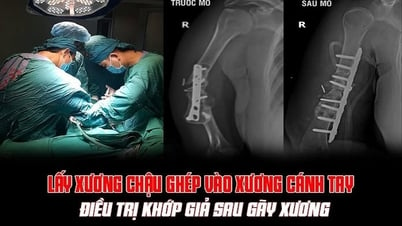

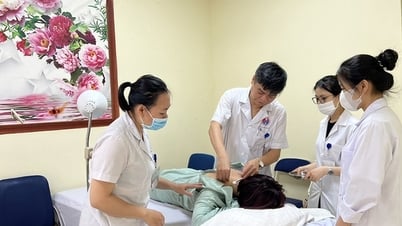

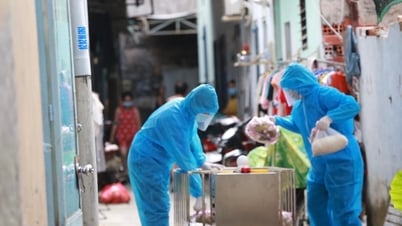

























































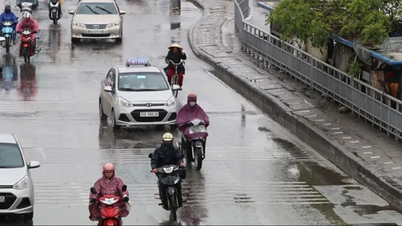


















Comment (0)